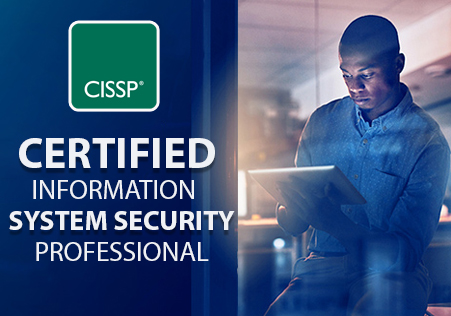
Certified Information Systems Security Professional (CISSP)
The Certified Information Systems Security Professional (CISSP) is a globally recognized certification in the field of information security. It is offered by (ISC)², the International Information System Security Certification Consortium. The CISSP certification is designed to validate the expertise of cybersecurity professionals in various domains related to information security.
Who should do This Course
The Certified Information Systems Security Professional (CISSP) certification is designed for seasoned information security professionals involved in shaping and managing an organization's security landscape. Targeting roles such as security consultants, analysts, managers, directors, network architects, engineers, system architects, and those in compliance and risk management, CISSP offers a comprehensive understanding of key security principles. While there are no strict educational prerequisites, candidates need a minimum of five years of relevant work experience in at least two of the CISSP Common Body of Knowledge (CBK) domains. Alternatively, a four-year college degree or approved credentials can be substituted. CISSP is recognized globally and proves beneficial for security auditors, analysts, and instructors, emphasizing the importance of ongoing professional development for maintaining certification. Aspiring candidates without the required experience can still take the exam, earning Associate status until fulfilling the experience prerequisite. Overall, CISSP is an advanced-level certification that signifies a commitment to excellence in the field of information security.
Duration : 2 Months
Exam Code :
- Exam Format:
- - The CISSP exam consists of multiple-choice and advanced innovative questions.
- - The exam uses Computerized Adaptive Testing (CAT), which tailors the difficulty of the questions based on the candidate's performance.
- Number of Questions:
- - The exam typically contains 100-150 questions.
- Question Types:
- - Multiple-Choice Questions (MCQs): Traditional multiple-choice questions where you select the best answer from the options provided.
- - Advanced Innovative Questions: These can include drag-and-drop and hotspot questions, requiring candidates to interact with the content in different ways.
- Passing Score:
- - The passing score for the CISSP exam is not a fixed percentage. It is determined through a psychometric analysis process, and the actual passing score may vary. Candidates receive a pass/fail result immediately upon completing the exam.
- Exam Duration:
- - The exam has a maximum duration of three hours.
- Exam Domains Weighting:
- - Each of the eight domains in the CISSP CBK has a specific weight in the exam. The number of questions related to each domain may vary, and certain domains may have a higher percentage of questions than others.
- Exam Availability:
- - The CISSP exam is available at Pearson VUE test centers globally. Additionally, (ISC)² offers online proctoring for the exam, allowing candidates to take the test remotely.
- Experience Requirement:
- - Candidates need a minimum of five years of cumulative, paid, full-time work experience in two or more of the CISSP CBK domains to qualify for the exam. Alternatively, candidates can meet the experience requirement with a four-year college degree or an approved credential from the (ISC)² experience waiver list.
- Exam Outline:
- - The official (ISC)² CISSP Exam Outline provides detailed information about the topics covered within each domain.
Why INFOBIT :
Infobit Technologies stands out as a premier choice for CISSP training due to its commitment to providing top-notch education and support in the field of information security. Here's why Infobit is your ideal partner for CISSP training:
- Industrial Experienced Faculty
- Certified Trainer
- Totally Practical Training into LAB
- Dedicated Lab Facility (10 AM to 7 PM )
- JOB Assistance
Course Content :
1. Security and Risk Management:
- Security Governance and Principles
- Compliance
- Legal and Regulatory Issues
- Professional Ethics
- Security Policies, Standards, Procedures, and Guidelines
- Risk Management Concepts
2. Asset Security:
- Information and Asset Classification
- Ownership
- Protecting Privacy
- Appropriate Retention
- Data Security Controls
3. Security Architecture and Engineering:
- Security Models and Frameworks
- Security Engineering Processes
- Secure System Design Principles
- Hardware and Operating System Security
- Cryptography
- Physical Security
4. Communication and Network Security:
- Secure Network Architecture Design
- Secure Communication Channels
- Network Attacks
5. Identity and Access Management (IAM):
- Access Control
- Identity Management
- Authentication
- Authorization
- Identity and Access Provisioning
6. Security Assessment and Testing:
- Security Assessment
- Conducting Security Testing
- Security Audit
- Vulnerability Assessment
7. Security Operations:
- Security Operations Concepts
- Incident Response
- Disaster Recovery Planning
- Business Continuity Planning
- Physical Security
- Personnel Security
8. Software Development Security:
- Secure Software Concepts
- Security in the Software Development Lifecycle
- Development Environment Security Controls
- Software Security Effectiveness

